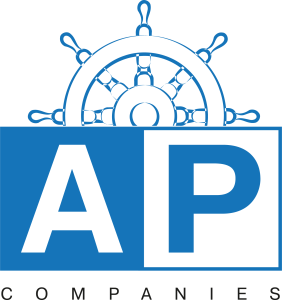Operating a commercial ship on the high seas involves significant logistical challenges, and one often-overlooked aspect is the selection and management of medications and supplies for the ship’s medicine cabinet and formulary, notes Arthur Diskin, Global Chief Strategy Officer, AP Companies.
This task is further complicated by the absence of medical providers onboard, leaving crew members to manage medical emergencies and routine health issues without real-time onboard professional guidance. Ensuring that the ship is stocked with the right medications, in the right quantities, and that crew members are trained to use them effectively, is a complex endeavor that requires careful planning and a deep understanding of maritime health needs.
1. Understanding Maritime Medical Needs
The first step in selecting medications for a commercial ship is understanding the specific potential health needs of the crew and the types of medical situations that are likely to arise during a voyage. Maritime environments pose unique health risks, including injuries from manual labor, exposure to extreme weather conditions, infections, and mental health issues due to isolation and long periods away from home. Common medical concerns on cargo ships include:
- Trauma and injuries – minor and major: Due to heavy machinery, slippery decks, and physical labor.
- Gastrointestinal issues: Resulting from dietary changes, food contamination, or seasickness.
- Infections: Including respiratory, skin, and gastrointestinal infections, often exacerbated by close quarters and limited hygiene facilities.
- Chronic conditions: Management of pre-existing conditions like hypertension or diabetes among crew members.
- Mental health challenges: Such as anxiety, depression, and stress due to long periods of isolation and demanding work conditions.
To address these diverse health needs, a well-rounded formulary must include a variety of medications for pain relief, antibiotics, gastrointestinal treatments, cardiovascular drugs, anti-allergens, and mental health medications.
The size of the ship and number of crew, historical utilization, type of services rendered onboard including level of occupational risk, length of deployment, ports and accessibility of medications, remoteness of itinerary, experience level (certificate) of lead medical provided on board, average age and nationality of crew are all legitimate considerations.
2. Regulatory and Compliance Considerations
Commercial ships may be subject to international regulations that dictate the minimum requirements for medical supplies and medications. The IMO and the World Health Organization (WHO) provide guidelines on the types of medical equipment and medications that should be onboard. These regulations are designed to ensure that ships are prepared to handle medical emergencies until professional medical help can be reached. However, these are recommendations and guidelines and need to be customized for the ships. They may be out-of-date as soon as they are published as advances in healthcare as well as availability of certain medications are constantly changing.
Ships are supposed to comply with the Maritime Labour Convention (MLC) 2006, which mandates that ships carry adequate medical supplies and that at least one crew member is trained in basic medical care.
Regulations and guidelines may specify the minimum quantities of essential medications, but the actual selection must be tailored to the specific ship, its voyage routes, and the composition of the crew. Ships traveling in remote regions or those with long durations between ports may require more extensive medical supplies than those operating on shorter, coastal routes.
3. Selecting the Right Medications
Selecting the right medications involves balancing the need for comprehensive medical coverage with the practical limitations of space, budget, and the crew’s ability to use the medications safely.
Key considerations include:
- Versatility: Preference should be given to medications that can treat multiple conditions. For instance, ibuprofen can be used for pain relief, inflammation, and fever reduction, making it more versatile than single-use drugs.
- Stability and shelf life: Medications must be stable under varying temperatures and conditions and have a long shelf life to minimize waste and ensure availability.
Considerations must be made to the expiration dates of the medications balanced with the frequency of use. The same medication with a shorter expiration date may be less expensive than the same drug with a longer expiration date. If the medication is very rarely used but the ship must carry the medication, it may be more effective to purchase that medication with a longer expiration date. It is very important to work closely with the vendor to optimize availability with costs. Certain medications may be eligible to be bought back by vendors when they are expired, or expiration date is approaching. All ships must have policies and procedures in place to ensure expired meds are replaced, especially those that are potentially life-saving or known to lose potency over time.
- Ease of administration: Without a medical provider onboard, medications should be easy for non-medical personnel to administer safely. This often means choosing oral medications over injections. Clear labeling and instructions are essential.
- Safety and side effects: Medications with severe side effects or complex dosing regimens are less suitable for a ship’s formulary.
- Availability: Some medications may be restricted or difficult to obtain in certain ports, so the availability and ease of replenishment should be considered when selecting drugs.
It can be very expensive to obtain medications in port or urgently ship medications directly to a ship in a remote location.
Companies must be very explicit in telling crew to bring all their chronic medication with them, including a supply that lasts at least 30 days beyond the expiration date of their contract, is case an extension is required. If there is a history of contract extensions for that company, crew may be told to bring their medications for even a longer period.
4. Challenges of Maintaining the Medicine Cabinet
Maintaining an effective medicine cabinet onboard a commercial ship is an ongoing challenge. Medications can expire, become damaged due to humidity or temperature fluctuations, or be used at a faster rate than anticipated. A system must be in place to regularly check inventory, manage expiration dates, and reorder supplies as needed. Medications must be immediately unpacked and stored appropriately, especially if delivered on ice and refrigeration is required.
Additionally, crew turnover can impact the consistency of medical care. New crew members must be trained in the ship’s medical protocols, including the location and use of medications in the formulary. Language barriers and varying levels of medical knowledge among the crew can further complicate the effective use of medications. Cultural differences in crew can affect willingness to seek care and use certain medications.
5. Training and Education of Crew Members
Since cargo ships often lack onboard medical providers, it is crucial that crew members are trained in basic first aid and the administration of common medications. The level of medical training among the crew can vary widely. It is very important that at least one crewmember (preferably at least two in case the primary medical officer is the patient) have STCW training with the more extensive Medical Care and Medical First Aid courses – as a minimum. Ongoing and more extensive training in the indications and use of onboard medications and patient assessment can be very beneficial.
Training should focus on identifying signs and symptoms, appropriate use of medications, and emergency procedures including knowing when and how to seek external medical assistance, such as contacting shore-based medical advice services, accessing telemedicine or coordinating an evacuation.
6. Telemedicine and Remote Medical Support
One of the most significant advancements in maritime health care is the availability of telemedicine services. Ships can now connect with medical professionals onshore for guidance during medical emergencies.
This support can include diagnosing conditions based on symptoms, advising on the use of medications from the ship’s formulary, and deciding when a medical evacuation is necessary. However, these services rely on reliable communication equipment and connectivity, which can be a limiting factor in remote areas.
It is very helpful if the provider of remote telemedicine services helps make recommendations as to the content of the medicine chest. In this way, they already know what is onboard. At a minimum, the telemedicine professional should be provided with a copy of the ship’s formulary.
AP Companies offers comprehensive telemedicine services designed to address these challenges. By ensuring crew members have access to round-the-clock medical advice, AP Companies helps ship operators manage medical emergencies in real time, even in the most remote regions. Furthermore, AP Companies can tailor ship medicine chests to specific voyage routes and crew needs, providing a streamlined approach to both healthcare and compliance.
Conclusion
Selecting and managing medications for a commercial ship’s medicine cabinet is a complex task that requires careful consideration of the crew’s health needs, regulatory requirements, and the practical challenges of maritime operations. With no medical providers onboard, the responsibility for managing medical emergencies falls on the designated crewmember with the highest level of training, experience, and education, making it essential to have a well-stocked, properly maintained, and comprehensively understood formulary, as well as high-quality telemedicine support.
In collaboration with AP Companies, ship operators can also optimize their medical chest supplies and gain peace of mind knowing their crew’s health and safety are managed effectively, no matter the voyage.
The views presented are only those of the author and do not necessarily reflect those of SAFETY4SEA and are for information sharing and discussion purposes only




























































